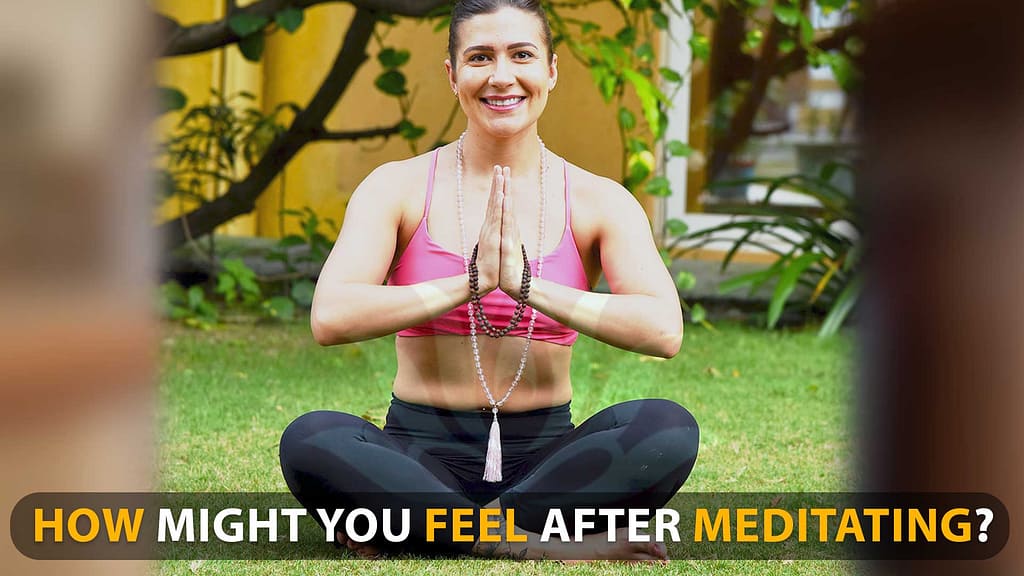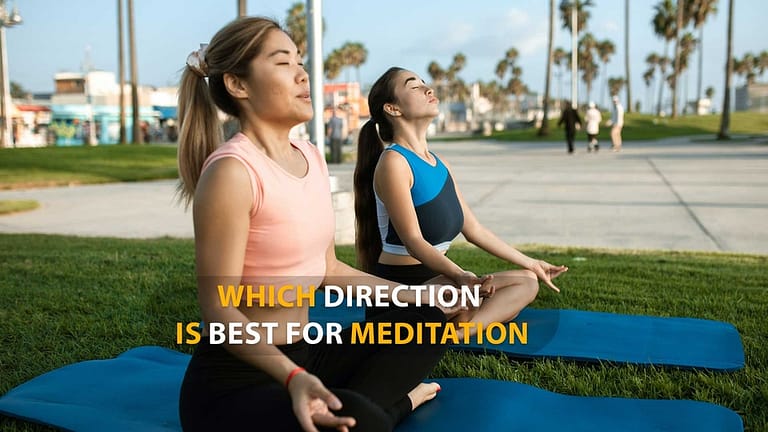How Might You Feel After Meditating? – Complete Guide To Simple Meditation In 2024

How Might You Feel After Meditating?
Many people have feelings of relaxation, concentration, satisfaction, and tranquility after meditating. There isn’t just one way to feel after meditating, though.
Following meditation, it’s natural to feel various emotions or sensations. Both techniques can cause different responses in every mind and body.
Meditation can induce emotions of peace, relaxation, and even euphoria with some practice. This “natural high” enables you to better control your emotions and get through trying circumstances. To begin with, choose a peaceful spot to practice meditation by yourself.
Since ancient times, many different civilizations and spiritual traditions have adopted the practice of meditation. Despite its roots in history, it was widely accepted in modern culture as a way to reduce stress, improve self-awareness, and promote inner calm.
This article explores the many outcomes and feelings one could encounter after practicing common meditation.
Read:
What Is Magnetic Pull During Meditation? – What You Need To Know In 2023
The most typical forms of feelings that are felt after mediation include the following

Relaxation and serenity
A deep sense of tranquility and relaxation is one of the benefits of meditation that is most frequently discussed. After practicing meditation, people often report feeling calmer and having less tension.
Focusing on the breath or a particular mantra helps to calm the mind and encourage relaxation, enabling people to carry this sense of peace into their everyday life.
Improved Clarity and Concentration
Mental clarity and attention are encouraged during meditation. Individuals can learn to monitor their thoughts without getting overwhelmed with regular practice.
This mental clarity might result in improved focus, decision-making, and problem-solving abilities. Many people discover they can better face obstacles with a clear and focused mind after meditation.
Emotional strength and peace of mind
People frequently gain emotional stability and resilience via meditation. The technique cultivates a mindset of non-judgment toward one’s thoughts and feelings and the acceptance of the current moment.
Individuals can notice their feelings when they adopt this non-reactive position. Consequently, people may find it easier to control their emotions and adapt to challenging circumstances with more resilience.
Increased Self-Awareness
Regular meditation promotes self-awareness by acknowledging one’s thoughts, emotions, and behavioral patterns. After practicing meditation, people may feel more self-aware, making it easier to identify and change unhelpful thinking patterns or behaviors.
Self-improvement, higher self-esteem, and a stronger sense of authenticity can result from this raised self-awareness.
Relationship and Kindness
Compassion for oneself and others is often developed by meditation. Mindfulness and non-judgment can help people grasp others’ perspectives and connect with them more.
Beyond the confines of meditation sessions, this newly acquired compassion may positively influence interactions and relationships in daily life.
A Basic Guide to Simple Meditation

To learn a quick meditation technique that can help you become aware of your feelings and emotions, follow these easy steps:
- Find a sitting or flat posture that feels comfortable. The better, the more cozy the setting. This will enable you to concentrate on the feelings in your body and mind completely.
- Maintain eye closure and quietness. During meditation, it’s critical to eliminate distractions. For best practice, eliminate as much “excess” as possible in your setting.
- Set an intention or slogan first. This might be as straightforward as “Peace,” “I’m happy,” or “I’m in love.”
- Now begin to inhale more deeply. Bring your thoughts back to your objective as you stray during the meditation.
- Take note of any ideas that come to mind. Note them down. The secret is to observe them objectively. Don’t criticize yourself or be concerned that you have departed from the practice.
- Although a straying thought is expected, returning to your goal is where meditation starts. As necessary, keep coming back to your objective as you concentrate on taking deep breaths.
- Go on for another 10 minutes. To regain feeling in your body, softly wriggle your fingers and toes after 10 minutes. After the 10 minutes have passed, open your eyes and evaluate how you are feeling.
Read:
Why Do I Feel Electrical Sensations After Meditation? – Unveiling The Reason Behind In 2023
What Happens If I Can’t Concentrate During Meditation?
Try guided meditation if you have trouble focusing during meditation. Throughout the exercise, the teacher’s voice will be with you, and when your thoughts stray, the representative will gently nudge you to focus on your breathing. Keep practicing this kind of meditation if you find it to be beneficial.

You might attempt the following techniques to sharpen your attention and concentration while you are meditating:
- Use a live instructor, audio recording, or video to offer direction.
- Create a mantra you can repeat when you feel your attention slipping.
- To recenter, time the length of your breaths as you inhale and exhale.
- Because some days will be more challenging, have patience and kindness with yourself.
- Regular practice will help you get more accustomed to being in a calm state.
- Purchase a quality meditation cushion.
What if my meditation is incorrect?

There are no right or wrong meditation techniques. You are the only person who practices meditation. The objective should be to discover a solution that suits you! Finding the correct meditation technique, adjusting the duration, or even changing how you sit may be part of this.
No matter how long you sit with your eyes closed during meditation, you will benefit from it. Every meditation technique is unique. Always. After meditating, your mind will be quiet one day and talkative the next.
After meditating, you could feel at peace and joy one day and nothing the next. As a result, there are no specific sensations or sentiments you ought to anticipate following your practice.
Read:
Why Do I Feel Cold After Meditation? – Secret Behind In 2023
Summary
Meditation has the power to change significantly how people feel and see life. Regular meditation may result in profound human growth, from the immediate impacts of calmness and clarity to the long-term advantages of mental wellness, self-awareness, and kindness.
Although each person’s experience may differ, the benefits frequently include increased peace, mental clarity, emotional well-being, and a sense of connection to oneself and others. Meditation may be an effective tool for inner growth and self-discovery with devotion and practice over time.
Frequently Asked Questions (FAQ’s)
Q. Can meditation help you feel more socially connected?
Meditation may improve one’s sense of belonging and empathy for others. People frequently get a more profound knowledge of the interconnectedness of all beings due to the practice, which encourages mindfulness and compassion.
A more profound sense of empathy, kindness, and a desire to interact with and help people in more meaningful ways might result from this heightened understanding.
Q. Are there any possible bodily effects from meditation?
After meditating, people may feel physically relaxed, their muscles will be less tense, their heart rate will be slower, and their blood pressure will drop.
Additionally, some people may claim to feel lighter or more energized. It’s crucial to remember that everyone’s experience might differ and will likely have various bodily symptoms.
Q. Can meditation affect how you feel all day long?
A consistent meditation practice may improve your mood throughout the day. People frequently discover that they can respond to daily obstacles with composure and a sense of peace when they practice mindfulness and emotional control.
Through developing a positive mentality, increased attention, and improved emotional health, meditation can contribute to a more satisfying and balanced experience throughout the day.
Q. How long do the benefits of post-meditation last?
The length of post-meditation effects varies from person to person and may be influenced by the frequency and duration of meditation.
While immediate results like calmness and clarity could only last a short while, long-term advantages like improved self-awareness and emotional stability might become more noticeable with frequent practice. Adding meditation to a regular schedule produces the results that endure the longest.
Read Also
- Can Reading Be Meditation? – Benefits Of Reading Meditation In 2023
- https://basicyog.com/which-direction-is-best-for-meditation/
- Can Pranayama Cause Chest Pain? – 5 Causes Of Chest Pain Due To Pranayama In 2023
- Meditation Before Or After Yoga – Suggestions For Improving Meditation In 2023
- Is Meditation A Form Of Worship? – Difference Between Worship And Meditation In 2023
- Is It Better To Meditate In Darkness? – Treatment With Dark Meditation In 2023
- Tingling Sensation Between Eyebrows During Meditation – What Is The Third Eye Sensation? in 2023






